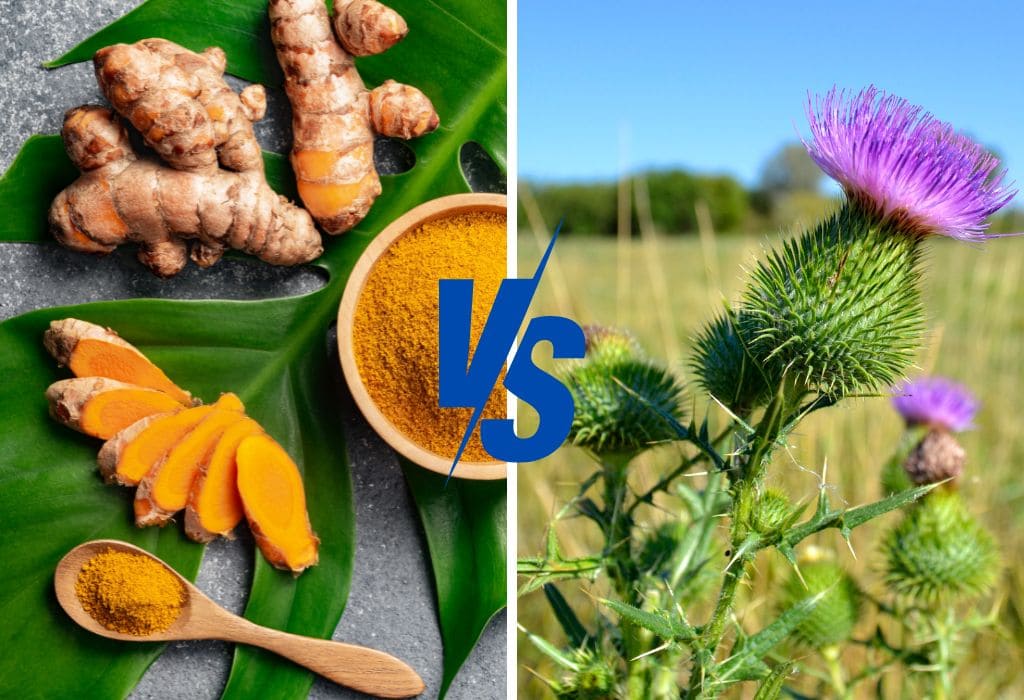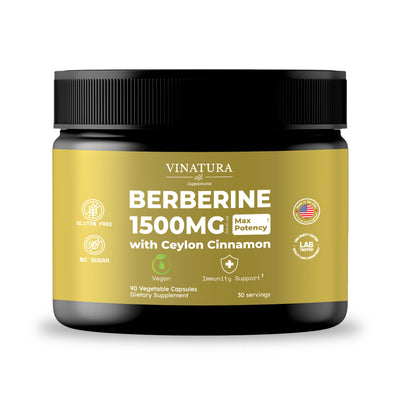
Turmeric Vs. Milk Thistle: Which Is Better for Liver Health?
Turmeric and milk thistle are two of the best liver health-supporting herbs applied for thousands of years. So, Turmeric vs. Milk Thistle, which herb is better for liver health? Can turmeric and milk thistle be combined, or must we use each separately? All will be answered in the following article!
Before exploring further, please read the disclaimer located at the end of this webpage.
Key Takeaways
- Turmeric and milk thistle both support liver health. However, each herb has a different mechanism of action and has its benefits for liver function.
- Turmeric helps increase bile production, purifies the liver, rejuvenates liver cells, and energizes them to eliminate toxins.
- Meanwhile, milk thistle has high anti-inflammatory and antioxidant properties, promoting liver cell regeneration.
- Turmeric Vs Milk Thistle: which herb is better for liver health? Turmeric and milk thistle are generally well tolerated but may cause some mild side effects in people.
- You can combine turmeric and milk thistle to reap the benefits of both herbs.
Overview Of Milk Thistle
What Is Milk Thistle And Its Mechanism?

Milk thistle, also known as Chamomile, Stump Thistle, and Holy Thistle, has the scientific name Silybum marianum (L.) Gaertn, belonging to the Asteraceae family. Milk thistle was first found in the Mediterranean. Currently, milk thistle is widespread in Central Europe, North Africa, South America,...
Silymarin, the main active ingredient in milk thistle seed extract, has been shown to protect the liver by being anti-inflammatory and antioxidant. In addition, Silymarin also helps improve liver function by stimulating detoxifying enzymes and promoting liver cell regeneration [1].
What Are The Key Benefits Of Milk Thistle?
As mentioned above, milk thistle has been used in liver-related remedies for hundreds of years. Modern scientific research has been studying and proving the effects of milk thistle on liver diseases.
- Research by Flora Kenneth et al., published in the American Journal of Gastroenterology in 1998, confirmed that Silymarin in milk thistle promotes liver cell regeneration, supporting the repair of damaged liver tissue [2].
- Research by Ludovico Abenavoli et al. has shown that milk thistle protects liver cells from fatty infiltration by enhancing the liver's ability to process and eliminate excess fat [3].
- Trappoliere and colleagues also came to positive conclusions that milk thistle can improve insulin sensitivity and lipid metabolism, reducing the destruction of liver cells [4].
Are There Milk Thistle Side Effects?
In general, milk thistle is well tolerated by everyone, including pregnant and lactating women. However, some side effects, such as flatulence, indigestion, rash, or diarrhea, may be mild.
In particular, milk thistle also causes drug interactions with drugs such as birth control pills, Sirolimus, Morphine, etc., so you should consult a specialist before use.
Understand Turmeric
What Is Turmeric And Its Mechanism?

Turmeric, also known as Haldi, is a herbaceous herb found in Asia and has been used in Tamil Nadu traditional medicine for thousands of years as a remedy for stomach and liver diseases.
Curcumin in turmeric is believed to have anti-inflammatory, antioxidant, antiviral, and antiviral activities, acting as a potential antiseptic [5].
What Are The Benefits Of Turmeric?
Clinical research has shown that the use of turmeric helps reduce cholesterol and triglycerides in the body, especially in people who are obese, have diabetes, and have chronic conditions [5].
Besides, like milk thistle, turmeric helps regulate lipid metabolism, increase insulin sensitivity, and limit virus damage to the body's liver cells [6].
A notable effect of turmeric on liver health is the creation of bile, which helps purify the liver and energize the liver to eliminate toxins [7].
Side Effects Of Milk Turmeric
Turmeric is considered a safe herb to consume at recommended amounts. However, using turmeric in high doses and for a long time can cause side effects such as nausea, diarrhea, and, worst of all, stomach ulcers.
Some recommendations to limit consumption of turmeric or functional foods extracted from turmeric are also given to pregnant women or patients with immune-related diseases.
Turmeric Vs. Milk Thistle: Which Is Better for Liver Health?
As analyzed based on previously conducted studies, turmeric and milk thistle support liver health. Turmeric has anti-inflammatory and antioxidant properties and helps protect the liver from damage. Meanwhile, milk thistle helps improve liver function, helps the liver detoxify, and promotes liver cell regeneration.
Which is better, turmeric or milk thistle? The answer depends on your health. You can use both of the above herbs to find the one that supports liver function that is right for you. Note that any supplement, even if it is a natural herbal supplement and considered safe, has potential health risks. So, please seek advice from a medical professional.
Can You Combine Milk Thistle And Turmeric?

Because ordinary people tolerate both milk thistle and turmeric well, it is possible to combine milk thistle and turmeric to reap the benefits of both herbs.
Currently, on the market, there are dietary supplements that combine extracts of milk thistle and turmeric, which have been researched and tested to support liver function. Therefore, you should refrain from combining these two herbs on your own. Instead, buy reputable supplements with explicit content and certification to be safe for your health.
How To Use Milk Thistle And Turmeric
Using Milk Thistle And Turmeric Separate
The safe dosage of milk thistle and turmeric, when used separately, is as follows:
- Turmeric: Use as a supplement, spice, or directly on the skin with a recommended dosage of 500 to less than 2000 mg daily.
- Milk thistle: Also used as a supplement, tea, or combined with food, the recommended amount is 50 to 150mg per day.
How To Take Milk Thistle And Turmeric Together
Supplements combining milk thistle and turmeric are usually in capsule, tablet, or powdered form with a recommended dosage of less than 150 mg per day and with supervision and prescription from medical staff.
Conclusion
Turmeric and milk thistle are both natural herbs beneficial for liver health. However, they have different benefits and mechanisms of action. Turmeric vs Milk thistle: which herbs to choose depends on your health condition and the liver problems you are experiencing. You can consult your doctor or healthcare professional to use a dietary supplement combining these two herbs to enhance liver function.
References
- [1] Rainone, F. (2005). Milk Thistle. American Family Physician, 72(7), 1285–1292. https://www.aafp.org/pubs/afp/issues/2005/1001/p1285.html
- [2] Flora, K., Hahn, M., Rosen, H., & Benner, K. (1998). Milk Thistle (Silybum marianum) is used to treat liver disease. American Journal of Gastroenterology, 93(2), 139–143. https://doi.org/10.1111/j.1572-0241.1998.00139.x
- [3] Abenavoli L. (2024). Scientific Information Database. www.sid.ir. https://www.sid.ir/paper/306371/en
- [4] Loguercio C, Federico A, Trappoliere M et al. The effect of a silybin-vitamin e-phospholipid complex on nonalcoholic fatty liver disease: a pilot study. Dig. Dis. Sci. 52(9), 2387–2395 (2007)
- [5] White, C. M., & Lee, J.-Y. (2019). The impact of turmeric or its curcumin extract on nonalcoholic fatty liver disease: a systematic review of clinical trials. Pharmacy Practice, 17(1), 1350. https://doi.org/10.18549/pharmpract.2019.1.1350
- [6] Mansour-Ghanaei, F., Pourmasoumi, M., Hadi, A., & Joukar, F. (2019). Efficacy of curcumin/turmeric on liver enzymes in patients with non-alcoholic fatty liver disease: A systematic review of randomized controlled trials. Integrative Medicine Research, 8(1), 57–61. https://doi.org/10.1016/j.imr.2018.07.004
- [7] Lee, H.-Y., Kim, S.-W., Lee, G.-H., Choi, M.-K., Jung, H.-W., Kim, Y.-J., Kwon, H.-J., & Chae, H.-J. (2016). Turmeric extract and its active compound, curcumin, protect against chronic CCl4-induced liver damage by enhancing antioxidation. BMC Complementary and Alternative Medicine, 16(1), 316. https://doi.org/10.1186/s12906-016-1307-6
Author

Product Disclaimer
The dietary supplement products mentioned on this website are formulated based on scientific research and adhere to FDA guidelines for dietary supplements. However, the content of the articles has not been evaluated by the Food and Drug Administration (FDA) and is not intended to promote or endorse any specific product. Any products sold on this website are not intended to diagnose, treat, cure, or prevent any disease.
Opinions and Endorsements
Any claims, statements, or opinions expressed in the articles are those of the author(s) and do not necessarily reflect the views or opinions of the manufacturers of the dietary supplement products. The products sold on this website are separate from the content of the articles and are not directly endorsed or associated with the information presented here.
Liability Disclaimer
The author(s) of the articles, website, and manufacturers of the dietary supplement products do not assume any liability for any potential consequences arising from the use of the information provided in the articles. It is recommended that individuals consult with a qualified healthcare professional before making any dietary or lifestyle changes, including the use of dietary supplements.
Product Usage
Please refer to the product labels and packaging for specific usage instructions and guidelines for the dietary supplement products sold on this website.
Customer Support
For any concerns or questions regarding the dietary supplement products, please contact our customer support team, who will be more than happy to assist you.





Leave a Comment
Be the first to comment.
What do you think?